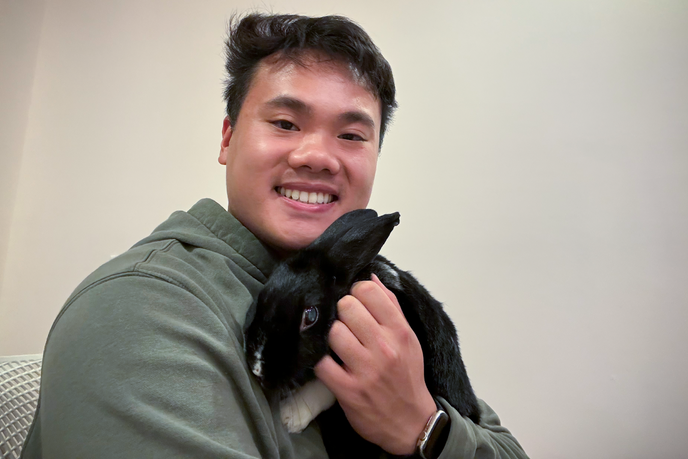ACES senior on improving veterinary mental health, compassion for animals

Students in the Department of Animal Sciences at the University of Illinois Urbana-Champaign are often drawn to careers enhancing the well-being of animals. However, veterinary careers aren’t without stress, and mental health care is often lacking for professionals in the field. To highlight this Mental Health Awareness Month, animal sciences major and senior Justin Chiu talks about his personal experience and advocacy regarding the impact of emotional support animals and mental health concerns in veterinary careers.
Chiu first became interested in studying in the College of Agricultural, Consumer and Environmental Sciences (ACES) after attending various Illinois 4-H, Illinois Extension programs, and the Research Apprenticeship Program — all programs housed within ACES. And growing up in a family with two veterinarians gave Chiu an early taste of the profession. But it was the connection he would develop with his pet rabbit during his first year in college that inspired him to explore the realm of mental health bonds with animals.
“I got my rabbit when my father was really sick, and my mother was going through chemo treatments. It’s cliche to say, but he was there when I needed him, a constant reminder that everything was going to be okay. He was also with me while I navigated college during COVID-19,” Chiu said. “That's why I started a side project to connect people in the community with emotional support animals to help them through trying times.”
That project took off via Design for America, a campus Registered Student Organization enabling creative solutions for real-world problems and social challenges through a human-centered design process. Chiu’s project facilitated pet adoption for community members in need of emotional support animals. Again and again, he saw pets change the lives of people struggling with mental health challenges.
Meanwhile, Chiu worked at a local vet clinic to further develop his practical skills in the field. There, he noticed mental health issues unique to the veterinary profession, prompting a move into advocacy.
“The veterinary industry has one of the highest suicide rates. A lot of the animals that come in to be treated are healthy, but other times, they’re at the end of their life or in a critical state,” Chiu said. “I’ve worked at a clinic for the past four and a half years now, and it’s something I’ve always struggled with. My veterinarian colleagues tell me you have this constant voice in your head saying you need to save every single animal that comes to your door. But sometimes you just can’t.”
Whether it is financial barriers, animal health complications, or the lack of resources to care for their patients, those who work in veterinary environments on a daily basis often face animal suffering or death. The practice of euthanizing animals can also fuel depression and anxiety in practicing vets.
“There’s a high rate of compassion fatigue among vets, which is why many choose to leave the field. Sadly, there hasn’t been much change regarding these problems,” Chiu said. “These occupations also have a huge debt-to-income ratio in comparison to human physicians, which often leads to burnout and more stress.”
Despite these issues, there are many ways to help vets struggling with mental health challenges. Chiu believes we should start by being more understanding.
“The main thing is for owners to recognize vets aren’t superhumans. We have to push for initiatives that acknowledge veterinarians enter this field out of a desire to help,” Chiu said. “Whether they are vets, techs, assistants, or receptionists, everyone in this profession is driven by their love for the human-animal bond and their desire to foster these relationships. Developing more understanding and compassion for the challenges veterinarians face can go a long way.”
Chiu will take the insights he has learned about mental health with him as he enters the workforce.
“I am currently focused on a career in research-based veterinary medicine, but I also plan to engage in some clinical practice in the future,” Chiu said. “I had a hard time choosing between veterinary and human medicine, but right now, I feel like I’m getting the best of both worlds.
The University of Illinois and College of ACES have various mental health resources available for students, including 24-hour hotlines, after hours support, and the Counseling Center. Students in ACES can also make an appointment to see their embedded counselor by contacting mlayng@illinois.edu. To learn more about mental health, wellness, and access and accommodation, visit the University of Illinois Mental Health and Wellness website or contact wellness@illinois.edu.